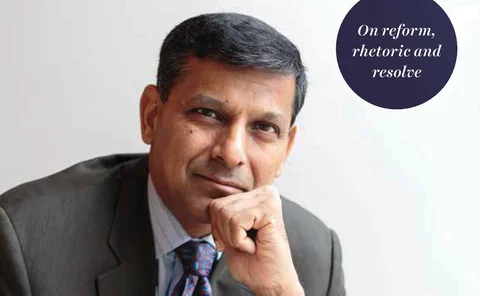CB In Depth
Book notes: Unelected power, by Paul Tucker
Tucker’s well-argued text sets out a set of principles for those in unelected positions of power to ensure they continue to act for the benefit of the general public, but Reddell says it is a shame more attention is not paid to smaller central banks
The toxicology of post-crisis shadow banking
Mark Carney tempted fate in 2017 when he declared the most toxic forms of shadow banking “no longer represent a global stability risk”. Did he speak too soon?
Philip Lane on systemic risk, transparency and Brexit
The Central Bank of Ireland governor speaks with Dan Hardie and Chris Jeffery about transparency, shadow banking, ECB succession and tackling systemic banking risk in the eurozone
Book notes: I do what I do, by Raghuram Rajan
This collection of speeches and commentary sheds light on how the ‘rockstar’ central banker operated, but it reveals little in the more controversial areas of Rajan’s governorship
Andreas Dombret on ECB policy, deposit insurance and Basel III
The Deutsche Bundesbank executive board member speaks about exiting QE, the viability of European deposit insurance, the German banking system and doing a deal on Basel III
The Bank of Italy’s approach to risk-based budgeting
The financial crisis blurred the lines between Anglo-Saxon and continental European central bank models, presenting challenges when treating both the sources of risk and risk-bearing capacity using financial and accounting budgeting techniques
Kganyago on central bank independence and future plans for the IMFC
The South African Reserve Bank governor spoke with Christopher Jeffery at the Central Banking Awards about the South Africa’s new president, the importance of operational independence and key targets for the IMFC
Central banks: the economy’s emergency responders
When economic infrastructure is destroyed during natural disasters, central banks spring into action, engaging contingency plans to ensure the economy continues to run
Book notes: The paradox of vulnerability, by John Campbell and John Hall
Quality of national institutions vital to handling financial crises, say authors
Former governor: Life lessons from Taiwan
Perng Fai-nan, former governor of the Central Bank of the Republic of China (Taiwan), shares key insights upon accepting Central Banking’s Lifetime achievement award
Book notes: A diary of the euro crisis in Cyprus
Panicos Demetriades’ book tells the inside story of the Cypriot crisis and how battles over central bank independence led ultimately to his resignation
Communications on financial stability should be strengthened
The IMF’s Olga Stankova outlines how central banks and other official agencies can better communicate their financial stability work
Book notes: Respectable banking, by Anthony Hotson
The author’s sensible goal of “respectable banking” is admirable, but the recommendations would not all help to achieve this
Canada’s polymer versus paper substrate cycle
Empirical evidence indicates the switch to a polymer substrate has improved the lifespan of Canadian banknotes, write Ramesh Paskarathas, Lynne Graaskamp, Erik Balodis and Theodoros Garanzotis
Book notes: How global currencies work, by Barry Eichengreen, Arnaud Mehl and Livia Chiţu
A comprehensive introduction to the history of global reserve currencies, with analysis of how advances in technology and the structure of trade have reshaped the landscape
Saudi Arabia’s Alkholifey on economic restructuring, reserves and cyber security
The Saudi Arabian Monetary Authority’s governor talks to Christopher Jeffery about the restructuring of the Saudi economy, the impact of low oil prices on reserves and anti-money laundering efforts
Implementing a holistic and dynamic risk budget
The National Bank of Denmark has implemented a dynamic risk budget that takes the bank’s unavoidable policy risks as the point of departure. The new approach has led to a reassessment of investment exposures and how they are rebalanced over time and…
A dangerous unknown: interest rate risk in the financial system
Urgent action is needed to tackle the little-understood build-up of interest rate risk in the global financial system; macro-pru tools still inadequate to tackle the issue
Home truths on Europe’s NPLs
Europe needs to overcome fears of a hypothetical crisis, and impose more intrusive supervision and greater provisioning on its banks
Book notes: The End of Theory, by Richard Bookstaber
Bookstaber provides an entertaining introduction to agent-based modelling – a potential new front for economics
Patrick Njoroge on reshaping banking and finance to work for the masses
The Central Bank of Kenya governor speaks to Christopher Jeffery and Rachael King about exchange rate intervention, food prices, banking reform and financial inclusion
Google’s Hal Varian on how technology is changing economics
Google’s chief economist talks to Christopher Jeffery about how big data and machine learning are facilitating changes in economic thinking; discusses the impact technical breakthroughs may have for central banks
Productivity puzzles and the neutral rate of interest
Monetary policy frameworks should be subjected to internal and external reviews to ensure they remain fit for purpose
Book notes: The Right Balance for Banks, by William Cline
An interesting analysis of optimal capital requirements for G-Sibs, examining whether Basel III requirements will be enough to stem another financial crisis























